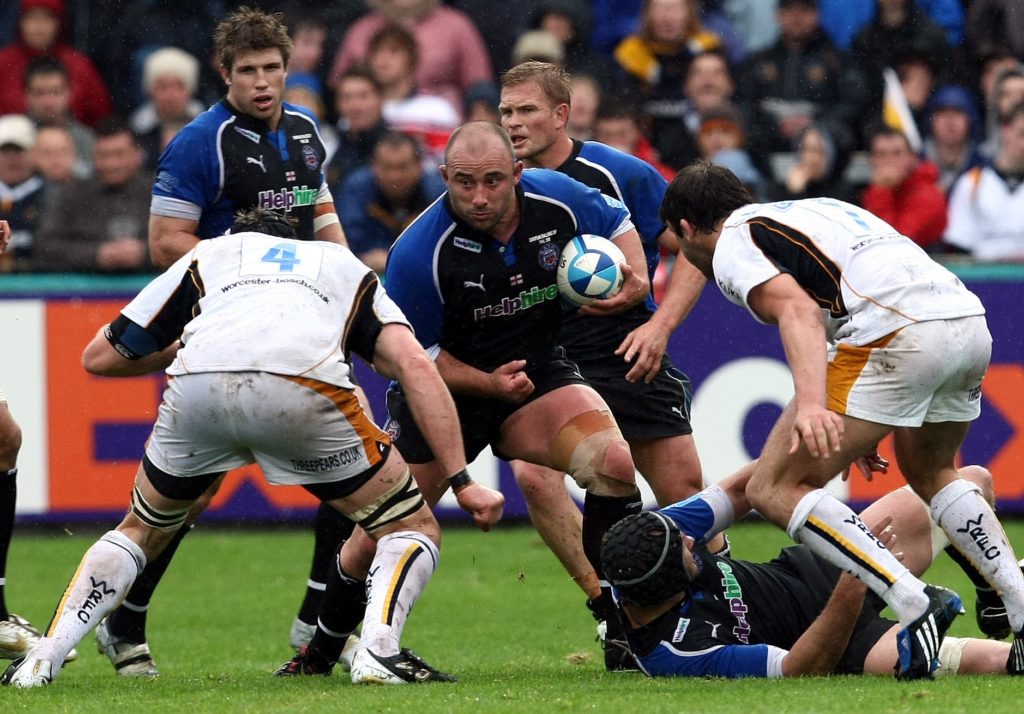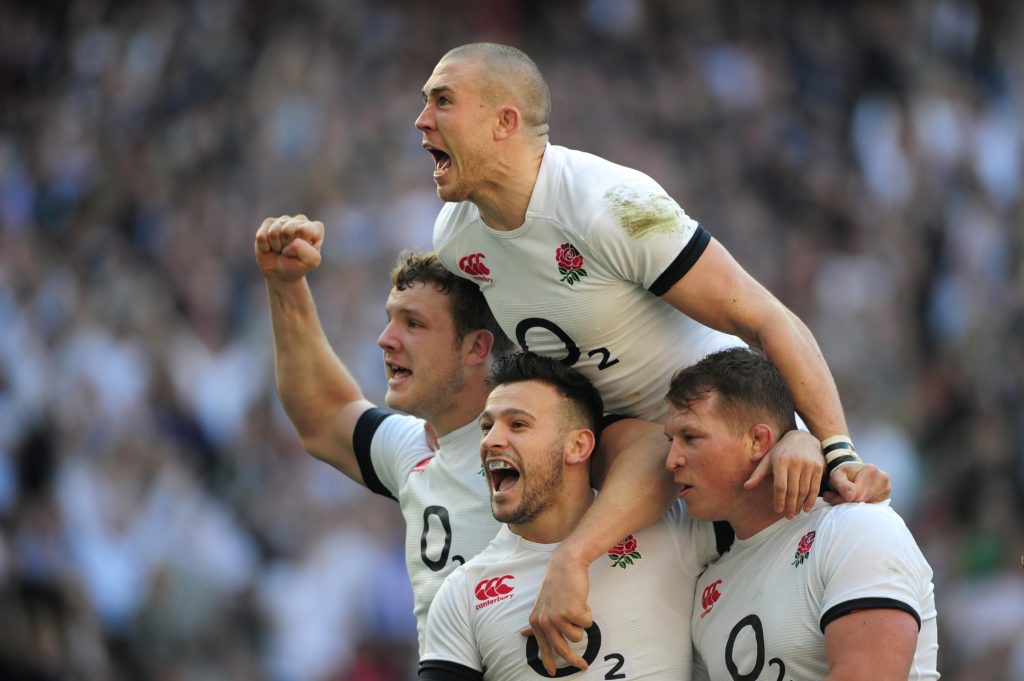A head coach once slid over to me on the sidelines of the training pitch in Bath, hands in his pockets to combat the cold, and used his eyebrows and a nod of his head to gesture towards a certain team-mate of mine who was wandering past, post-session, blood streaming from a tidy split in his eyebrow. “We could do with about 30 blokes like that, mate,” he said. “He’ll die for the team and you can pay him fuck all.”
I nodded and said: “Yep,” as he wandered off, regretting my compliance and naivety in the seconds that followed. Not only did I miss, in the moment, that this was a semi-direct dig at me, a reasonably well-paid front rower who was, again, injured and therefore offering no value, but I also missed his inference that if I really cared, I’d be out there. That my injury wasn’t a real one.
As it happens, it became a bilateral shoulder reconstruction that, a month later, saw my poor sisters having to bathe me, feed me and drive me to physio every day as neither of my arms worked. Still, soft. I also grew more annoyed, as the wind blasted over me, at the sheer lack of respect he’d shown to my mate. This player – and I shan’t name him for obvious reasons – was indeed a warrior and we loved him, and his relatively low salary had now effectively been broadcast by his boss. Shoddy moves.
A time later, my contract was up and, what with a whole load of other things that had happened at the club – with this same man in the middle of most of them, politicking and whispering and scoffing in absentia – I didn’t trust him to treat me properly. Having asked him for the club’s position on my future employment, he offered no answer of note and seemed almost to visibly enjoy keeping me on tenterhooks. This, I said to a fellow player, is a man who should never have been given such power.

Some men see their influence increase and achieve with it a higher state of humility as the augmented breadth of their responsibility becomes clear, while others become the guy put in charge of parking at a rugby club on a Sunday morning and given a hi-vis jacket to confirm his status, becoming Adolf reincarnate (this reminds me of a little traffic warden who once fairly asked me to move from a ‘loading’ zone in London and, as I started to ask him if he knew of any decent spots nearby, burst out with: “Don’t annoy me!” Astonishing and agonising in equal measure. I may or may not have quietly alerted him to the fact that, should I so desire, I could pull both of his arms off which would both annoy him and stop him writing me up a ticket. Can’t remember now…).
When the man – it’s almost always a man, for now – at the top behaves poorly, two things happen: he gives any other potentially suboptimal operators unwritten permission to do precisely the same, which gradually but certainly erodes whatever good there is in the building. Also, he makes it almost impossible to feel loyal towards him. And because the club – by which I mean their senior management – effectively allow, even endorse, this behaviour both by not stopping it and by giving him lots of money every month, he ultimately turns you against your club. Get rid of him soon enough and you can survive it. Don’t and you won’t. We didn’t.
I played hard for that club, I loved my job and laughed every day, but perhaps I too often said what I thought. I wasn’t abrasive and I wasn’t hard to manage, yet something was going on.
What happened to me was a series of events that, frankly, have left me feeling no loyalty whatsoever to my old club, Bath. I love some of the lads, sure, and I’d rate Stuart Hooper as one of the very best men I know. The team manager is a legend and I was almost excessively proud to play for them.
But stage one of my contract chats was the day the kit man (a good and bright bloke who wanted some more responsibility, so was involved in the early stages of some recruitment) called me and asked if I had the number of a loosehead prop who played for Leicester. I didn’t, but then I don’t suppose it mattered if I did or not. This was a call he was asked to make in order to unsettle me. Why? I don’t know. I trained and played hard for that club, I loved my job and laughed every day, but perhaps I too often said what I thought. I wasn’t abrasive and I wasn’t hard to manage, yet something was going on.
I ended up calling the CEO and asking straight up what was the score – and my contract was signed about five minutes later. They never intended not to re-sign me but somebody saw an opportunity to dominate a situation that didn’t need dominating and took it.
Then Steve Borthwick – one of the great men and the king of our then-improving team and club – was ignored for so long while trying to arrange his contract that he left, and good on him. Slowly but surely, there was nobody and nothing left to be loyal to. “I love this club, though,” I once said to a retired Bath player. “Do you?” he asked, “or do you love the club it used to be?”

Ultimately, one year into my final three-year deal, I was taken aside by a wonderful man who was part of the backroom staff at Bath and shown a trail of emails that diluted any remaining loyalty within me. I was told that the club were trying, in effect, to find a way to terminate my contract on grounds of physical incapacity due to years of shoulder injuries. I was leaking penalties hard at scrums and hating rugby for this reason so, had they asked me to step aside, I likely would have done. Instead, they told the team doctor to test and record the range of movement in my shoulders for the first time (at the age of 32), presumably as a first step towards proving I was broken (despite being fit for almost every game that season). To his eternal credit, Sir Ian McGeechan approached me, told me he knew what was going on and that he wasn’t having it. I will remain loyal to Geech for ever.
But loyal to the club for whom I smashed my body to pieces? To the club for whom I turned down lucrative offers from elsewhere? To the club for whom I would have – and I mean this – died on that field? No, loyalty died a while back. They wanted me off the players’ wage cap so, just like that, it was gone.
While these things still go on, undoubtedly, rugby tells us repeatedly that it is improving; it tells us that, as a sport, it ‘gets’ mental health and it ‘gets’ what soft skills are needed when dealing with human beings who are more, of course, than just rugby players (some coaches wear their lack of emotional nuance – and therefore empathy – as a badge of honour and, frankly, at least they’re not faking it for likes, as the instagram generation might say).
It’s not the decision per se; as we all disagree with anyone who thinks we’re past it. It’s the way in which it is communicated and handled.
I look at Mike Brown leaving Harlequins and feel similar feelings to those I felt at the end of my Bath career. It’s not the decision per se; as we all disagree with anyone who thinks we’re past it. It’s the way in which it is communicated and handled.
Brown, about 350 games in for Quins and arguably in the form of his life, was treated poorly and Quins should have done so much better. I’m sure Quins will deny that but the players know because they are Brown’s friends. And this news travels. Will Joe Marler have to chase his director of rugby for answers, arriving to pivotal meetings about his and his family’s futures, to find nobody else has remembered or turned up? Will Danny Care be told, ‘You’re out’ in a four-minute meeting?

I hear this stuff and I think this: either Quins knew far earlier than the news was delivered that they wouldn’t extend Brown’s contract (they may have their salary or young prospect-based reasons, which I do not know so will not contest) and delayed or bottled telling him, or they only made their minds up so late, almost of the cuff. I could be wrong, but suspect the former. A Quins icon – probably the best ever – battling for answers and being shown so little love and respect that it becomes yet another tale of a professional rugby club’s short-sightedness, deleting loyalty where once it burned so bright. Imagine having Brown on your team for the last 350 games and imagine not treating him like the bona fide legend he is when the end came.
Money can breed loyalty but wages paid will only earn an organisation so much in that sense.
Clubs like Exeter and Saracens are held up as shining, almost extreme examples of how human beings in sport ought to be treated but I wonder if they’re actually all that special. I wonder if they just look exceptional because so many of the other clubs are so awful at the human side of professional sport. Money can breed loyalty but wages paid will only earn an organisation so much in that sense. Pretty soon, what a player earns is simply what he earns. Then it’s down to the soft stuff, the necessary stuff, the human stuff. I am a firm believer that treating people very well is very easy, and that some genuinely great people let their job specs take over, become somewhat overcome by the pressures of the job and forget to do it. And players hate it; they really, really hate it. It can feel as if your muscles are given endless thought, while your soul is given none.
I’m not bitter about my stuff – genuinely. Not even a tiny bit. I believe my old club are in a good place overall and that their Director of Rugby gives nobody permission to be snide or a bully. Bath are a club who could, over time, become great once again and that real, proper loyalty is something that could be built there.
It’s sad that it melted away in my time but where there is progress, there is hope. Loyalty, like reputations, is hard earned and very easily lost.
More stories from David Flatman
If you’ve enjoyed this article, please share it with friends or on social media. We rely solely on new subscribers to fund high-quality journalism and appreciate you sharing this so we can continue to grow, produce more quality content and support our writers.


Comments
Join free and tell us what you really think!
Sign up for free